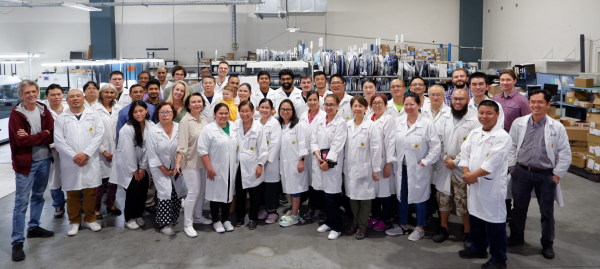The CEO of Australian medical technology company Circuitwise says they are 'passionate' about the benefits of local manufacturing.
Serena Ross says Australian governments and its health authorities have become more conscious of the sector's critical role in protecting the country's health and security.
She says Circuitwise is one of the few companies left with the domestic capability to manufacture complex medical technology.
Ms Ross says this is why in the early period of the pandemic it was one of the first contacted by the Medical Technology Association of Australia (MTAA) in response to a desperate search by the Victorian Government for someone to manufacture ventilators.
The Sydney-based electronics sub-contracting company was established around 30 years ago and currently employs 60 people, including production engineers, technicians and operational staff. It specialises in the manufacture of complex electronic devices, such as contrast injector systems used in CT scans.
“By the time COVID-19 arrived in Australia, there was already a worldwide shortage of ventilators. As case numbers rose in Victoria, the Government found itself scrambling to find additional supply," says Ms Ross.
“Countries that manufactured these products naturally got priority and Australia was pushed to the bottom of the queue.
“At the time, no company in Australia was manufacturing ventilators, putting us in a very risky situation in the event of an uncontrolled outbreak,” she says.
The MTAA said it was contacted by the Victorian government and brought Circuitwise together with Grey Innovation to quickly establish a domestic manufacturing capacity for ventilators.
Ms Ross warns that if this ability is lost, Australia may be left very vulnerable to similar health threats in the future. It will also lose the wider benefits, including the high quality and reliability that results from working closely with the original equipment manufacturer (OEM).
“Companies come to us if they have a complex product that needs to be built to the highest possible quality,” she says.
“People outside of the medical technology field don’t always understand the crucial role manufacturing plays in producing medical devices. Unlike the pharmaceutical sector, in MedTech the manufacturer is really an equal partner with the original designer.
“In fact, we have a saying in the MedTech sector: The design is only as good as the manufacturer.”
Ms Ross continues, “Good communication between contract manufacturer and OEM prevents a lot of problems in the first place. But if there is a problem, it makes it much easier to quickly identify and fix the issue.”
She also urges the government to consider the importance of domestic manufacturing capability in its current consideration of reform to the Prostheses List.
“The changes being pushed for by the insurers are all about driving down costs at the expense of quality.
“The DRG-based [Diagnostic Related Group] system, suggested by the insurers, would mean that the priority will be how to make devices as cheaply as possible. Doctors won’t be able to choose the best quality devices and so will use cheaper products with poorer results.
“This means poorer quality care for patients and over time it will make it more difficult for companies like Circuitwise to stay in business.
“It won’t happen overnight but eventually our domestic manufacturing sector will disappear, with profound impacts beyond the health system. If MedTech manufacturing doesn’t stay in Australia, then electronics manufacturers won’t stay. And without a domestic electronics manufacturing industry we will be exposed in other areas, such as defence.
“Once these skills, technology and capacity go offshore, it’s almost impossible to ramp them back up quickly - leaving Australia very vulnerable in a crisis or emergency situation. We need to ensure that our domestic manufacturing sector remains viable or one day we’ll find that it isn’t there when we really need it.”
